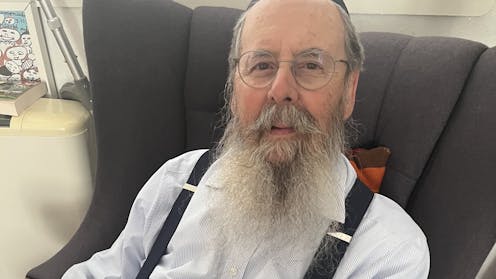The Melbourne butcher’s son who converted to Judaism and guided 10,000 lives in death
- Written by The Conversation

Stella Prize shortlisted author Katia Ariel admits to a “pre-emptive regret” at not being able to include the personal details of each of the thousands of souls relayed to her by Ephraim Finch, director of Melbourne’s Chevra Kadisha – or, Jewish Burial Society. From the mid-1980s to 2015, he buried over ten thousand individuals. The book largely unfolds through a series of deep-dive conversations between Ariel, Finch and his wife, Cas.
Ariel writes that anyone living in the Melbourne Jewish community during this period would “for better or worse” have had something to do with the working-class butcher’s son (originally Geoffrey Finch), a voracious archivist and beloved community figure with a “broad Aussie accent”. In the foreword to her book on Finch, author Arnold Zable calls him a “community ferryman”.
Review: The Ferryman: The Life and Deathwork of Ephraim Finch – Katia Ariel (Wild Dingo Press)
Finch and Cas converted to Judaism when he was in his 20s, some years after she found a guide to modern Orthodox Judaism, Herman Wouk’s This is my God, in a newsagent and felt “the traditions make perfect sense […] nothing else feels as warm, as deep”.
In his three decades in his role, Finch was devoted to holding and guiding thousands of kindred souls to their resting place. He did this by chronicling the lives of each one of them in his personal archive. Many of these souls were Holocaust survivors. Ariel writes:
He will reiterate to me, over and over, how important it is to ask questions, to let people speak, to listen deeply.
Reading Ariel’s work, the reader is at once reassured of the power of story, while bearing the weight of the countless tales left untold.
‘Ritual becomes everything’
Ariel notes Finch’s practice of giving each family he encountered at the burial society a copy of Maurice Lamm’s The Jewish Way in Death and Mourning. According to Jewish law, the dead must be buried within 24 hours of dying, where possible. She is particularly intrigued by the ritual of tahara: the sacred act of purifying the body before burial, through washing and prayer.
Ariel pored over Finch’s journal entries, documents, photographs and transcripts of interviews with family members of the deceased, to shape them into a narrative. The result is a hybrid memoir that shines upon the remarkable Finch, a boy from Sydney who found his calling in Judaism and humanism – and ten years after retirement, continues to visit his “village”, Springvale Jewish Cemetery.
Towards the end of The Ferryman, Ariel reflects on when Finch’s handwritten chronicles first crossed her desk. She reverently interviews him and many of the bereaved he counselled. She spends countless hours in his home, with his family.
She accompanies him to visit familiar, revered souls in the “village”. She listens as Finch bears the details of every soul he has buried. “Hello, dear boy”, he says, as if to recognise the person beneath the grave.“You see, I buried this boy …”
She sits with some community members, too, including Finch’s longtime friend, Max Dzienciol, who opens up about losing his seven-year-old son, Nathan, hit by a car in 1990. He remembers Finch driving the hearse at Nathan’s funeral, and later holding his hand in the Coroner’s Court. He calls him “the person who’s there without you knowing”.
Ariel describes herself as “a Jew to the same extent that I am a secular humanist, a product of my agnostic world and its mixed-bag customs”. Except when it comes to births and deaths, when she has “never been so grateful for the structure, the scaffolding, of ancient tradition”.
In a stroke of creative genius, Ariel weaves herself into the flickering, incandescent accounts — lost daughters, fathers, brothers, friends. She learns there is no way to “memorialise all the memorialising”. Nonetheless, with Finch, she carves out a lyrical tribute to both the living and the dead, to all those Finch’s compassion touched.
As Ephraim’s quiet knowing awakens memories, his stoicism and faith – in humanity and in worlds beyond – is pervasive. As we tread a non-linear path, carefully and mutually laid by Ariel and Finch, readers might feel their own fears and experiences of grief soften and morph, into something more open to the crossing that awaits.
Beyond earthly stories
From the outset, it is clear the reader has been gently nudged to a place beyond earthly stories; a “tapestry” of community — a spiritual and eminently human “collaboration”, as Ariel puts it.
Yet the reader is pulled back from the brink of death, through all the gorges and rivers of life, while knowing, with searing clarity, they have been touched by a rare and wondrous human being in Ephraim Finch.







